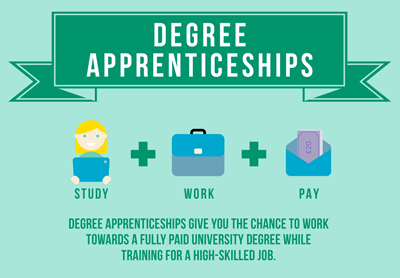Employers and Universities: Work with us?

How to make the most of National Apprenticeship Week
What is National Apprenticeship Week?
With the help of employers and universities, the government has put a lot of money into turning apprenticeships into a viable alternative to university as a route into high-skilled careers. For some students, apprenticeships can be an even better option because as they can train and gain qualifications while earning a wage.
However, the sheer number of apprenticeships, and the range of different types, means that understanding and finding apprenticeships can be quite confusing. This makes National Apprenticeship Week a great chance to talk about apprenticeships with students and help students decide whether they might be the best choice after school or college.
When is National Apprenticeship Week?
In 2017, National Apprenticeship Week will take place from Monday 6th March to Friday 10th March.
This year, National Apprenticeship Week celebrates its 10th anniversary, and the will be “ladder of opportunity”.
Here are four things you can do to make this National Apprenticeship Week a success:
1. Educate young people about apprenticeships
First and foremost, you can make sure young people understand what apprenticeships are and the opportunities available to them at different stages of academic achievement.
You can find plenty of resources here on the Success at School website, and you’ll find links to the most useful articles below.
Apprenticeships are a way of training for a specific job while earning a wage.
The different types of apprenticeships are:
- Intermediate: A level 2 qualification, equivalent to 5 GCSEs, often a stepping stone to an advanced apprenticeship.
- Advanced: This level 3 is the equivalent to 2 A-levels.
- Higher: A-levels are usually required for this level 4+ apprenticeship, through which apprentices can gain a foundation degree or higher.
- Degree: Apprentices gain a bachelor’s degree or higher through this apprenticeship route to high-skilled work.
 Degree apprenticeships are new, but more and more employers are offering them in tandem with universities. In summer 2016, we put together this infographic which puts degree apprenticeships into a nutshell – you can download it free from our online store.
Degree apprenticeships are new, but more and more employers are offering them in tandem with universities. In summer 2016, we put together this infographic which puts degree apprenticeships into a nutshell – you can download it free from our online store.
Along with higher apprenticeships, degree apprenticeships can be the perfect option for young people who are considering university as a route into a particular, high-skilled career.
National Apprenticeship Week also celebrates traineeships, which are six-month programmes which are designed to give students the skills they need to get onto an apprenticeship programme.
Some of our other resources:
- How to find an apprenticeship
- What should I look for when applying for an apprenticeship?
- Seven things all teachers and students should know about apprenticeships
- The most common myths about apprenticeships
Have some fun:
- The top five apprenticeships in the UK 2016
- Unusual apprenticeships
- Six famous people who started out as apprentices
2. Make it hands on with events and activities
Making National Apprenticeship Week interactive is a great way to engage students – whether that means running your own events and activities in school, or attending external events such as conferences and roadshows.
Invite external speakers to school/college
External speakers could be:
- Nearby employers who hire (or are planning to hire) apprentices.
- Local business leaders who have flourished after doing apprenticeships.
- Parents who have done apprenticeships.
- Friends, colleagues and former colleagues who have done apprenticeships.
How to connect:
- Inspiring the Future is a good way of connecting with local employers.
- Contact your local authority, who may have an apprenticeships contact who can connect you to willing employers.
- Ask students to talk to their parents about coming in to speak.
- Invite parents into school or college.
Attend external events
Connect students with employers by taking them to a roadshow.
 National Apprenticeship Events is a national event taking place at the International Conference Centre (ICC) in Birmingham on Wednesday 8th March 2017. Some very big employers will be attending to advertise their apprenticeship opportunities. You can book free on their website.
National Apprenticeship Events is a national event taking place at the International Conference Centre (ICC) in Birmingham on Wednesday 8th March 2017. Some very big employers will be attending to advertise their apprenticeship opportunities. You can book free on their website.
Check out your local authority’s website, as many will be running similar, smaller-scale events where students can meet local employers.
Don’t forget about your best friend, Google – try searching “national apprenticeship week events in [your area]”.
Use social media
Success at School will be posting plenty of juicy apprenticeship-related titbits to our social media channels during National Apprenticeship Week, and you can follow us on Twitter to stay updated.
- Share the love by retweeting our Twitter posts to your colleagues.
- Email your students with any content that might be particularly useful to them, or use it as a discussion point in class.
If your school/college has social media channels that students subscribe to, you can share relevant content on these accounts during National Apprenticeship Week.
Oh, and it’s not strictly social media, but we’ll also be sending out a mailing with some last minute tips to help you make the most of National Apprenticeship Week, so make sure you’re on our list.
3. Connect students with apprenticeship opportunities
For students in Years 11 and 13 approaching the end of their school/college careers, National Apprenticeship Week is an invaluable chance to look at some real opportunities they may not have considered.
But for Year 10s and Year 12s too, viewing real opportunities might just be make all the abstract talk of apprenticeships that bit more concrete.
You can see live apprenticeship vacancies now on the Success at School website.
Image credits
http://www.freepik.com/free-vector/business-conference-concept_789964.htm
